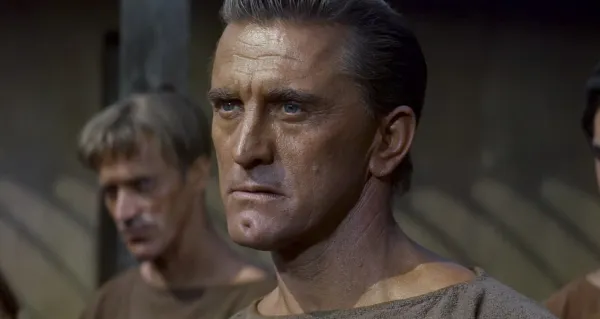Kirk Douglas in Sparticus, courtesy of the Academy Museum
(Note: This is the edited text for Rampell’s introduction to the April 29 screening of Spartacus at the Academy Museum for The Hollywood Ten at 75 Film Series from April 13-30 commemorating the 75th anniversary of the Hollywood Blacklist. A startling thing occurred during the Spartacus screening: As the first rebellion of the gladiators erupted, one of the warriors struck a Roman with a weapon and at that exact moment one could see the celluloid jump out of the projector’s sprockets and then watch the film literally burn. It seemed as if the gladiator’s mighty blow actually caused a remarkable, real life special effect, which literally brought the show to a halt and the houselights went on in the packed almost 1,000-seat David Geffen Theater in the Academy Museum’s Sphere Building. Stunned audience members were anxious that the screening would not be able to continue, but in that show biz tradition, the show must – and did – go on. Apparently, projectionists were able to splice the film together and viewers were able to watch the epic all the way to the end without any additional mishaps. Although it turned out that five feet of the special 70mm print was literally incinerated!)
We’re in for a real treat tonight, watching the colossal slave revolt epic Spartacus in 70mm on the big screen with a new print courtesy of the Academy Film Archive. We’re also fortunate to have Nancy Escher, the daughter-in-law of Dalton Trumbo, the movie’s screenwriter, with us to introduce Spartacus.
Along with Otto Preminger’s Exodus, which was also written by Trumbo in 1960, Spartacus plays an important role in film history. These were the first times that the credits of screenwriters who had been blacklisted appeared onscreen when these movies were released. Historically, this marked the beginning of the end of the Hollywood Blacklist – and, arguably, the start of the sizzling sixties.
Both films deal with the subject of revolt, which at its heart is a theme near and dear to all revolutionaries, as is the saga of Spartacus in particular. Rosa Luxemburg, Karl Liebnecht and Clara Zetkin named their WWI era German revolutionary party the Spartacus League, and today there is a similarly named Trotskyist organization in the USA. The Soviet composer Aram Khachaturian created the ballet Spartacus in 1954 to celebrate the slave revolt.
Of course, Exodus is complicated by the Palestinian rights issue, but it does depict anti-colonial, urban guerrilla warfare against the British, six years before Gillo Pontecorvo’s The Battle of Algiers. The theme of revolution is more clearcut in Spartacus, which Trumbo adapted from the novel by Howard Fast. Like Trumbo, Fast had been a member of the Communist Party USA. While Trumbo was called as the second member of the Hollywood Ten to testify before the House Un-American Activities Committee in 1947, Fast was subpoenaed to appear before Senator Joe McCarthy’s
Senate Permanent Subcommittee
on Investigations in executive session on February 18, 1953
. After you watch Spartacus
you’ll know why!
A main reason why Trumbo, and other members of the Hollywood Ten and subsequent “uncooperative” artists were blacklisted is because they refused to become informers and to give the names of colleagues and friends who may also have been progressives. In Exodus, when Sal Mineo joins the terrorist radical group the Irgun, he takes an oath vowing never to inform. Without disclosing a plot spoiler, please note how Dalton Trumbo literally deals with the issue of informing and naming names at the rousing, unforgettable conclusion of what I believe is Dalton’s greatest movie, Spartacus.
Now, before I turn the program over to Nancy, I’d like to ask everyone who wants to, on the count of one, two three, to stand and declare: “I’m Spartacus!”
One, two, three: “I’m Spartacus!”
[Hundreds of viewers chanted “I’m Spartacus!” – a stirring sign of solidarity – followed by Dalton Trumbo’s daughter-in-law taking the stage to share her insightful reflections on the screenwriter, her late husband Chris Trumbo and of course Spartacus.]
Ladies and gentlemen, please welcome Nancy Escher.
For details see:
https://www.academymuseum.org/en/programs/series/the-hollywood-ten-at-75



